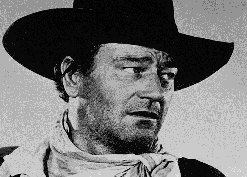Assuming they do, that is. Here's an exchange on subject with correspondent Khan. It's a response to the
negative review of
The Searchers I linked to in July.
The writer found it strange that they seemed to identify with the cowboys, and not the actual Natives in the film, who were stereotypes.Many Indians have identified with the cowboys rather than the Indians in Westerns. See
The Harm of Native Stereotyping: Facts and Evidence for examples. And why not, since everyone loves a winner? Why would an upstanding Indian want to associate with the murderous
savages in a typical Western?
Indians could've loved
The Searchers for several reasons. Because the Indians in the film came off better than the John Wayne character. Because the film exposed the racism inherent in our culture. Or simply because they finally saw themselves on the screen in
any role, no matter how unrelated it was to their actual lives.
None of this has anything to do with the quality of
The Searchers, which was the writer's point. Regardless of its racism, the film is highly overrated.



4 comments:
I can easily separate the form and the content when I comment on a movie. My critiques of a fantasy like Brother Bear or Kronk's New Groove are as tough as those of a realistic feature like Into the West or Black Cloud.
So whether the representations in The Searchers are literal or symbolic, they're still racist and stereotypical. And I agree with the critic who said the movie is overrated.
In The Harm of Stereotyping: Facts and Evidence, I've quoted dozens of experts who say people learn about Indians from movies and TV. The audience may know that the characters and plot are fictional, but they don't necessarily know that the background info (such as the depictions of Indians) is fictional.
Are you suggesting people don't get their racist and stereotypical ideas about Indians from movies such as The Searchers? If so, where do they get them from?
Incidentally, I agree that Citizen Kane and Star Wars are (slightly) overrated and Gone with the Wind is hugely overrated.
You really think most people sit around the dinner table or the church pews discussing Indians? And parents instruct their kids on the finer points of playing cowboys and Indians? I must've had an unusual upbringing, because that wasn't my experience. I doubt my family mentioned Indians even once. I haven't polled the people I know, but I'm guessing none of them discussed Indians either.
School is a different matter. But how many hours of instruction do you think schoolchildren get about Indians? Forty? Eighty? Whatever the number, I bet most kids spend more hours playing games, watching Western movies and TV shows, reading books and comic books, dressing up for Halloween, coloring in coloring books, watching football games with mascots, etc.
I'm talking many more hours. In fact, I bet it isn't even close. It's tough to quantify, but I'd guess my media exposure to Indians outweighed my scholastic exposure by at least 2 to 1. More likely the ratio was 4 to 1, 8 to 1, or more.
Heck, consider the TV shows alone: The Lone Ranger (live and animated versions), Bonanza, F Troop, The Go-Go Gophers, etc. I definitely spent more hours learning Indian stereotypes on TV than I did in school. Again, it's not even close.
All the influences I've listed come directly or indirectly from the surrounding environment via the media. In other words, kids pick up most of their "knowledge" by culturual osmosis--not from parents, teachers, or preachers. Everything from Disney videos to commercials like Zagar and Steve to Land o' Lakes product packaging reinforces the message. Indians are savage and uncivilized or simply exotic and strange.
Anyway, you don't have to take my word for it. I referred you to the page with quotes. Rennard Strickland, Cornel Pewewardy, and Chris Eyre are among the professionals who say Americans learn about Indians primarily from the media.
The facts and evidence support my position. For instance, a poll of American Indian leaders said the cause of anti-Indian sentiment was media stereotypes (45%) and systemic racism (22%). So you'll have to do better than simply telling us you disagree. Where's your counterevidence that parents, teachers, and preachers have more influence than the media?
If the people of Red Lake wish to dispute Strickland, Pewewardy, et al. about the source of stereotypes, they're welcome to. But I'm guessing they'll agree with the experts and me, not with you. Sorry.
Children may learn about mainstream American culture in their homes and schools, but they generally learn about ethnic cultures (other than their own) in schools and the media. With the emphasis on the latter.
As I think I said before, I was briefly a member of the Woodcraft Rangers when the program was Indian-themed. All these Scouting and Scouting-like programs have Indian influences. But it's difficult to say whether the influences come straight from the "community" or are shaped by media stereotypes.
Post a Comment